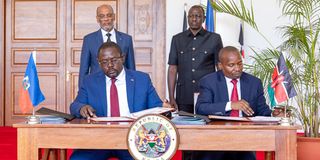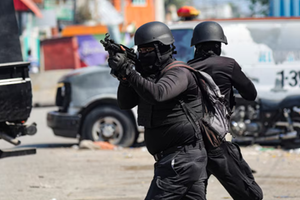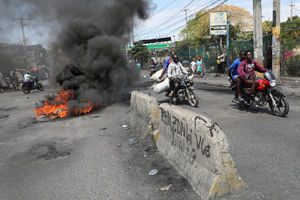
A masked man calls on demonstrators to stop during a protest against Prime Minister Ariel Henry's government and insecurity, in Port-au-Prince, Haiti March 1, 2024.
The expected deployment of Kenyan police to Haiti has kept many tongues wagging. Many, and in candid talk, seem to be of the view that the situation in that country is so dire that President William Ruto will just be sending Kenyan officers to a certain death against hardened street gangs with nothing to lose.
In Haiti, the world sees assorted and lawless bands armed to the teeth and ready to shoot without even an iota of provocation. Many see a country without a government, a society in its death throes, a dangerous place to be, and Kenyan police will be headed there to restore order. What many Kenyans aren’t aware of is that the State won’t be sending regular police to a war zone.
The Nation has established that Kenya will only deploy officers from its elite units to the United Nations Security Support Mission in Haiti.
According to informed sources, only officers from the elite General Service Unit’s Recce Squad, Administration Police Service’s Rapid Deployment Unit (RDU), and Border Patrol Unit will be deployed once a Presidential Council has been established and an interim Prime Minister installed.
Kenya’s 1,000-strong team will lead other officers from Belize, Bermuda, Benin, Spain, Senegal, Antigua, Jamaica and Bahamas in the Multinational Security Support Mission operation to stabilise Haiti. A summit of Caribbean countries and other partners, including the United States, met in Kingston, Jamaica, under the chairmanship of the Caribbean Community chair Irfaan Ali, also the Guyanese President.
The deployment of the Multinational Security Support Mission was authorised through United Nations Security Council Resolution 2699/23 and endorsed by 13 of the 15 members of the council including Africa’s representatives Gabon, Ghana and Mozambique.
The resolution was passed under Chapter 7 of the UN Chapter that recognises the situation in Haiti as a threat to global peace and security. The deployment was halted after gang members escalated hostilities with the Haitian government, released thousands of prisoners, attacked and overran police stations and laid siege to the airport, barring Prime Minister Ariel Henry who had been in Nairobi to sign a document allowing Kenyan police to be deployed to his nation.

Former police officer Jimmy "Barbecue" Cherizier, and leader of an alliance of armed groups, speaks to a news outlet on a mobile phone during a news conference, in Port-au-Prince, Haiti, March 11, 2024.
These elite units are the only ones that could have a chance against the Haitian gangs, most of them led by former police and military officers. Sources at Vigilance House have revealed that the deployment will be divided into four sectors around the country for easier management of the operations. Kenya’s elite units are likely to be deployed in the capital city, Port au Prince, which has been taken over by armed gangs.
The Recce Squad is an elite police unit that’s usually armed with M16s, UZI assault rifles, AK-47s and Glock pistols suitable for urban warfare. After initial training at Embakasi GSU training camp, recruits with exemplary talent are picked for further training at the Magadi camp, Solio ranch and Ruiru College for marksmanship and weaponry. Those who excel are then taken to Israel, US and the United Kingdom for commando training.
Headquartered in Ruiru, Recce Squad is a covert unit believed to have over 2000 highly trained officers with a continuous recruitment policy.

President Ruto and Haiti PM Ariel Henry witnessed the signing ceremony in State House Nairobi.
Its members also provide security to the presidency, select embassies and high commissions and senior government officials on a need-basis.
Those we spoke to expressed desire to serve the country in whatever capacity they can.
“I would be glad to be deployed anywhere in service for the country. What I have seen about the gangs in Haiti doesn’t show any huge challenge. With the training we receive, we can handle the situation if called upon,” one of those likely to be deployed said.
Recce Unit’s operations were witnessed by Kenyans during the Westgate Mall, Dusit D2 Hotel and Garissa University terror attacks. Recce commandos are also attached to the Anti-Terrorism Police Unit. When Recce commandos get to 35 years, they are redeployed to specialised units that complement regular police in crime fighting, such as the Flying Squad.
They are the country’s most sophisticated police commando unit, only comparable to the Kenya Defence Force’s Special Forces and Ranger Force.
The other elite squads that will be deployed to Haiti are the RDU and BPU. These two are components of specialised units of the Administration Police Service that undergo paramilitary training just like the Recce Squad. RDU and BPU have in the recent past been used by the government to keep the country safe especially in remote parts, and can be quickly mobilised to respond to emergency situations.
The government has used both RDU and BPU to counter attacks by al-Shabaab terrorists.
BPU is an elite unit based in Kanyonyo, Kitui County, which has been deployed in trouble-hit areas in North Eastern and the Rift Valley.












